
Exclusive reports from Crime Fiction's international big-bash by our roving reporter.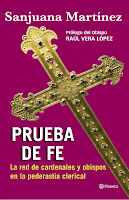 7th day - La Semana Negra recognition
7th day - La Semana Negra recognition
Every year La Semana Negra awards writers for their literary work. The jurors of the prizes are always fellow writers, and although the prize is not monetary, as Spanish writer and one of the winners of the Hammett award said, “It gives you prestige because it is not driven by anything else than the quality of the work. It's very transparent.”
Here is the list of categories and the 2007 winners: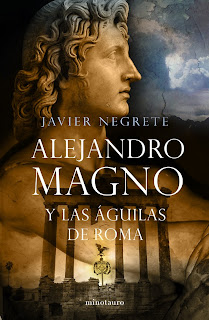 The Hammett Prize to the best detective fiction novel written in Spanish given by the Asociación de Escritores Policíacos:
The Hammett Prize to the best detective fiction novel written in Spanish given by the Asociación de Escritores Policíacos:
This award was a tie, so it’s shared between the Spanish Juan Ramón Biedma for his novel El Imán y la Brújula and the Argentinean Leonardo Oyola for Chamamé.
The Espartaco (Spartan) Prize given to the best historical novel written in Spanish was given to the Mexican writer Antonio Sarabia for his novel Troya al Atardecer.
The Memorial Silverio Cañada Prize given to the best first published detective fiction novel written in Spanish was given to the Argentinean writer Carlos Salem for his book Camino de Ida.
The Rodolfo Walsh Prize, for the best nonfiction detective book written in Spanish, was given to the Mexican writer Sanjuana Martínez for Prueba de Fe. The Celsius 232 Prize for the best science fiction or fantasy novel was given to the Spanish writer Javier Negrete for his book Alejandro Magno y las águilas de Roma. There was a special mention by the jury to the Spanish writer José Carlos Somoza for his book La Llave del Abismo.
Also, for a short story contest, the Ateneo Obrero de Gijón Prize was given to Nacho Padilla for “Viaje al centro de una chistera” (Trip to the center of a top-hat).
The prizes were given at 10:30am on July 19th at a press conference in Gijón’s Hotel Don Manuel. The room was jam-packed with nominated writers, press, and all the staff of La Semana Negra. There was a special energy in the room, and although local television channels were present covering the prizes, everything seemed so intimate. No one except the jurors, not even Paco Taibo, II, knew who the winners were, so everyone was anxious and expectant, especially the nominees.
The winner of each category was read off by one of the jurors. They opened a white envelope and off a handwritten letter read a special message from all the jurors and then announced the winner. Every time one was read, the room was invaded by a wave of claps, yells, and hugs for the winners. 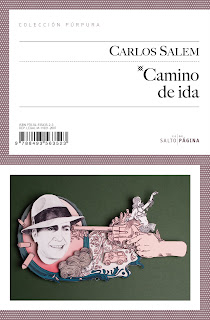 Leonardo Oyola, a winner of the Hammett Prize shed a few tears. Carlos Salem was also very moved and happy; it’s his first published novel ("Camino de ida"), and as he said when he received the prize, “Your own fellow writers are the ones who recognize your work, and that makes this prize so important.”
Leonardo Oyola, a winner of the Hammett Prize shed a few tears. Carlos Salem was also very moved and happy; it’s his first published novel ("Camino de ida"), and as he said when he received the prize, “Your own fellow writers are the ones who recognize your work, and that makes this prize so important.”
All the writers recognize the importance of giving each other recognition, but in the case of Sanjuana Martínez and his investigation book on the victims of Mexican Catholic pederast priests, she affirmed that the award is also “recognition of the courage of the victims, to all those who have suffered and are still suffering.”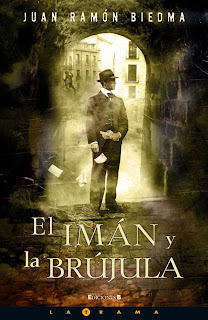
Following is a short introduction to the winner’s books. I hope these books get translated into English soon, but if not, definitely keep a close watch for them, because Semana Negra winners have a tendency to win more literary prizes.
The Hammett Prize: Juan Ramón Biedma's El Imán y la Brújula is a political novel of Spain during 1926, an espionage plot, where extreme situations are abundant and with the end of the war of Morocco as a background.
Leonardo Oyola's Chamamé (a traditional danceable rhythm of the northeastern Argentina) is about the persecution of two asphalt pirate gangs after the theft of loot. A vibrant story about a settling of scores.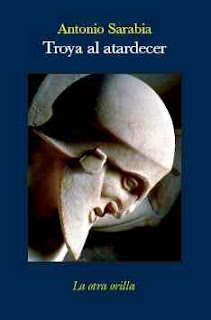 The Espartaco (Spartan) Prize: Antonio Sarabia's Troya al Atardecer is a war novel that tells the story of twin brothers who fight on opposing sides.
The Espartaco (Spartan) Prize: Antonio Sarabia's Troya al Atardecer is a war novel that tells the story of twin brothers who fight on opposing sides.
The Prize Memorial Silverio Cañada: In Carlos Salem's Camino de Ida, Octavio Rincón’s authoritarian woman dies during their vacation, and it’s the best thing that ever happened to him. Perplexed at the fact that his most profound wish in life has been realized and confused between this wish and his fear of becoming a suspect of her death, he embarks on a wild journey.
The Rodolfo Walsh Prize: Sanjuana Martínez's Prueba de Fe is a denunciation book against at least two prominent Catholic cardinals, Norberto Rivera Carrera and Juan Sandoval Iñiguez.The Celsius 232 Prize: Javier Negrete's Alejandro Magno y las águilas de Roma. Alejandro didn’t die in Babilonia. The hypothesis presented in the book is that he was poisoned by his ambitious wife Roxana in connivance with Perdicas, one of the generals, but a mysterious doctor Nestor arrives just in time to neutralize the intoxication.
José Carlos Somoza's La Llave del Abismo is a futuristic thriller that evokes a shadow universe. It is also a journey through the ins and outs of faith, a reflection over what it means to kill in the name of religious beliefs, and a revelation of what is hidden behind them.
Saludos desde Gijón!
Thania Muñoz
Viewing: Blog Posts Tagged with: incipient, Most Recent at Top [Help]
Results 1 - 3 of 3
Blog: La Bloga (Login to Add to MyJacketFlap)
JacketFlap tags: Semana Negra, Gijón, Thania Muñoz, Juan Ramón Biedma, Sanjuana Martínez, literary prizes, Javier Negrete, Carlos Salem, Nacho Padilla, Antonio Sarabia, Leonardo Oyola, 2008, Add a tag
Blog: La Bloga (Login to Add to MyJacketFlap)
JacketFlap tags: horror, 2008, Semana Negra, Paco Taibo, Gijón, Thania Muñoz, crime fiction, España, tertulias, Juan Ramón Biedma, Rafael Marín, Roberto Ampuero, Elia Barceló, Add a tag

Exclusive reports from Crime Fiction's international big-bash by our roving reporter.
I've been looking for a word to correctly translate “tertulias.” Since unfortunately I didn’t bring my big and thick Oxford dictionary with me, I relied on wordreference.com. The definition it gives doesn’t transmit the same meaning to me, but then again, I think about all the translations in the world, from the classics of literature to Latin American literature translated into English, and I convince myself and say "don’t be so stupid, translations are not that bad."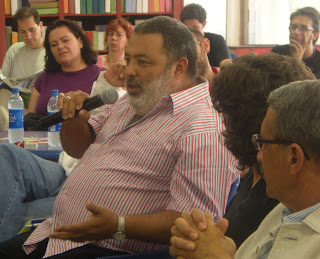
So, according to my online translator tertulias are: literary gatherings, and I’m sticking to that term. At La Semana Negra, every day at five, there are tertulias where the invited writers discuss a topic. It’s an hour-long debate where they give their own opinions and even get into arguments with the other writers.
The first three literary gatherings where dedicated to the “monsters” of literature or film. The panel included Mexican writer, Miguel Cane, Spanish writers, Elia Barceló, Cristina Macía, Rafael Marín, Daniel Mares, Marc R. Soto, Victor Condé, Federico Fernández Giordano, Rodolfo Martínez, Juan Miguel Aguilera, Eduardo Angulo and Manuel Nonídez.
Right off the bat, the debate heated up. Some said Mr. Hyde is the worst monster of all time; others thought it was zombies and of course the always scary vampires. Although the list of monsters was very long, Mr. Hyde took the prize. Rafael Marín took the discussion to another level by saying Mr. Hyde scares us because he demonstrates that “we could be monsters, too.”
After that “Alien” made an appearance in the discussion and writer Elia Barceló defended him, affirming that “the only thing Alien is trying to do is defend himself.” Some agreed, some didn’t, but what made the literary gatherings more interesting was the great number of people listening to this conversation full of some very nerdy details on movies and books.
Although at the beginning in the “Carpa del encuentro”, Semana Negra's main tent, there weren’t many people, as time went by more slowly started coming. I would look around at the puzzled faces: some were ready to get up and say something, and others nodded when they agreed with what one of the writers said.
The guys next to me confided in me (I think because I was taking notes the whole time), “Yeah, I know it’s so cool to find out that you are not the only one that talks endlessly about these things.” These tertulias bring people closer to the writers so they have the opportunity to get to know them in a more personal way. After the debates are over, you see spectators coming up to the writers, saying they agreed with what they were saying, that the other writers were wrong, or something of the sort.
After the “monsters” tertulias, the next two followed the theme entitled “El mal y sus protagonistas” (wordreference.com again: “Evil and its main characters"). This time it was Paco Ignacio Taibo, II, the Cuban Lorenzo Lunar, Colombians Mario Mendoza and Nahum Montt, Mexican writer Eduardo Monteverde, the Chilean Roberto Ampuero, the Chicano Rolando Hinojosa, and Spaniards Ángel Tomás González, Kama Gutier, Juan Ramón Biedma and Achy Obejas. 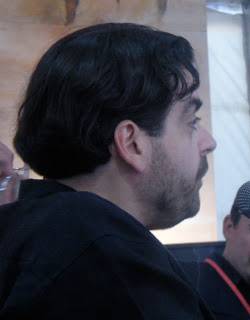
This tertulia focused on evil in these writers' own literature, why they write detective fiction, hardboiled, gothic and such, summarizing why their characters or stories are in some way evil. Juan Ramón Biedma at one point, firmly and passionately said, “Because good characters are boring.”
Simple and clear as that, but Roberto Ampuero, the Chilean writer who teaches at the University of Iowa, said “I live in a country (USA) that is constantly trying to separate good from evil, and of course George W. Bush is always saying that we are good, but it’s a lie and it makes no sense. 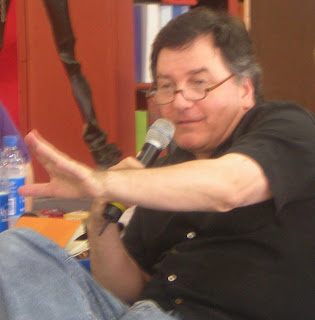 That’s something that intrigues me--why people are always trying to differentiate good from evil, if in reality we are both.” The debate continued on that note, and most of the writers agreed evil is very ambiguous and that we all have the possibility of being the hero or villain, because evil is something within us, something natural.
That’s something that intrigues me--why people are always trying to differentiate good from evil, if in reality we are both.” The debate continued on that note, and most of the writers agreed evil is very ambiguous and that we all have the possibility of being the hero or villain, because evil is something within us, something natural.
I don’t want to scare anybody--I know Vampires and Mr. Hyde are not the prettiest things--but I definitely wanted La Bloga readers to know what topics are discussed at La Semana Negra and to make sure everyone gets a feel of the types of discussion that happen here. But not only that; I also wanted to pass on the excitement and happiness that people who attend this gathering feel.
I’m sure some of you reading this will love hearing your favorite writer talk about his horror characters or why they write the way they do and how they build their characters. It’s a special thing and the spectators certainly recognize this, because during the discussions, they didn’t stop taking photos and notes. As someone behind me said, “I’m posting this on my blog.”
Saludos desde Gijón!
Thania Muñoz
Blog: OUPblog (Login to Add to MyJacketFlap)
JacketFlap tags: trib, salim, checkup, unequal, cn13, insipient, incipient, A-Featured, Lexicography, Dictionaries, Add a tag
Insipient writers often throw in big words like insipient/incipient at incipient stages of their careers. Say that five times fast! To learn how to use these words properly keep reading. If you liked this usage tip check out Garner’s Modern American Usage. To subscribe to his daily tips click here.
incipient; insipient.
The former means “beginning, in an initial stage”; the latter is an obsolete word meaning “unwise, foolish.” But “incipient” is often misspelled with an “-s-” — e.g.: (more…)



Thania, thanks for taking notes at the tertulia about evil characters. The authors' combined definitions of monsterism has given me the key to unlock a mystery about one of the characters in my new novel: he is an evil ex-boxer-veterano-pachuco. He is insensitive, detached, narcissistic, cold-blooded and a hardboiled monster. He's Mr. Hyde alright, El Pachuco Malo de Boyle Heights trapped in the era of film noir. I hadn't realized this until you made the connection for me at La Semana Negra, Muchas Gracias!
nlf
Thania,
Thank you for taking these notes at La Semana Negra. I am sure that there are so many activities going on that you cannot cover all of them, but what you post everyday is just perfect to give us an idea of what is going on there. As you know, literature is not my forte, but I can tell you that I read the book where Mr. Hyde comes out and I was shocked when the book reveals the identity of Mr. Hyde. As the writers mentioned in their tertulia, it is in our nature to be both good and evil at the same time. Those trying to identify the evil and eradicate it most of the time end up being the evil without noticing it. Saludos.
cHaNgUiTo
Wow!! I'm so thankful for the comments
I have a lot of notes, that I'll type up when I'm back, so please email me if you are interested
[email protected]
Norma, I cant believe my notes helped you so much, I feel amazing. By the way, a pachuco malo de boyle heights sounds extremely interesting!!!!
saludos!
Corrections, my friend and amazing cuban writer Rodolfo Perez Valero kindly corrected me on something. It turns out writers Ángel Tomás González and Achy Obejas, are Cubans, not Spanish. Sorry, a big mistake and I apologize!